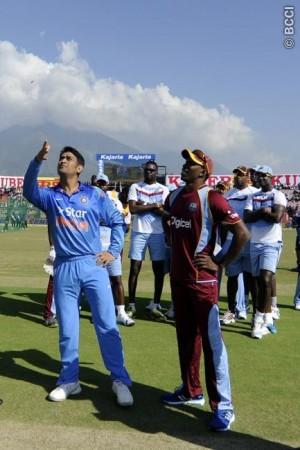
The West Indies Cricket Board (WICB) began an emergency meeting on Tuesday as the Caribbean body faced up to the crisis caused by the abandonment of their tour in India.
Just hours after India's powerful cricket board (BCCI) announced they would take legal action against the WICB and were suspending all planned tours of the Caribbean -- moves that could have a devastating financial impact on the West Indies -- officials gathered at a beachside hotel to deal with the fallout.
The return home of the team after the fourth of five one day internationals and before the three scheduled test matches, left India facing losses, according to Indian media reports, of around $65 million.
Although WICB leaders, including president Dave Cameron, were tight-lipped before the meeting, the solemn mood as they filed into a conference room was sign enough of the gravity of the situation facing them.
The board is expected to release a statement after their meeting later on Tuesday.
On the agenda will be the tricky issue of how to try to repair relations with the BCCI, the most powerful domestic body in world cricket, and avoid a legal case which could cripple Caribbean cricket.
India were due to tour the Caribbean in 2016 and if that tour is lost, the WICB will miss out on lucrative television and sponsorship deals.
The WICB is also expected to discuss what, if any, sanctions to take against the players who rejected a deal struck between the board and the player's union (WIPA).
WICB later released a statement. "The West Indies Cricket Board regrets, and is deeply embarrassed, by the premature and unfortunate end to the recent tour of India," the statement said.
"The WICB once again expresses to the BCCI and all stakeholders – especially the cricket-loving public of the West Indies and India – sorrow for the events leading up to this development.
"The WICB believes a way can be found to repair the damage that has been caused and to ensure similar events do not recur, with the focus being on the betterment of West Indies and world cricket."
The cause of the conflict was a new 'Memorandum of Understanding' and collective agreement between the WICB and WIPA regarding payment for players which the leading test players said was signed in September without their consent.
The players said the deal would result in a significant loss of earnings while the WICB argue the new arrangement allows for more cricketers across the Caribbean to be given central contracts.
Grenada's Prime Minister Keith Mitchell on Tuesday publicly offered his services as a mediator.
"Clearly there are going to be a lot of reverberations from this. There must be contracts and signed arrangements that involve costs and the image of our cricket team certainly will suffer," said Mitchell, who said the situation reflected badly on the whole Caribbean.
"It is a bit frightening for the region, not just for sports, but for our people, our economies on the whole."
The situation has caused dismay in a region where, despite disappointing performances, there remains a great passion for cricket and pride in West Indies' past achievements.
There appears little sympathy for any of the disputing parties but former pace bowler Michael Holding is among those who put the blame at the feet of the WICB.
"The problem with West Indies is that the WICB always pushes things to the brink and waits till the last moment," said Holding, now a television commentator.
"That is why so many tours begin with the players having not yet signed tour contracts... They wait until they get to India and then try to manipulate the players."















